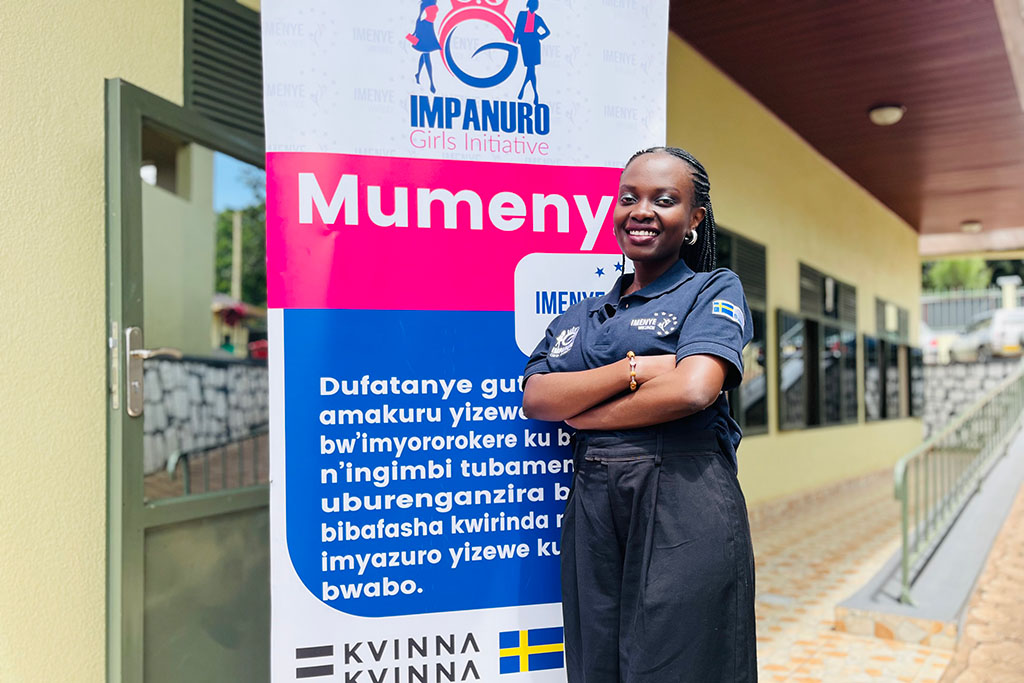A holistic approach to addressing teenage pregnancies in Rwanda
From going door-to-door and speaking to teen mothers in her community, to becoming one of The Kvinna till Kvinna Foundation’s partner organisations: for six years, Marie Ange Raïssa Uwamungu has worked relentlessly to improve the lives of women and girls in Rwanda.

It was back in 2010 that Marie Ange Raïssa Uwamungu first noticed an increasing number of teenage pregnancies in her community and among her friends—many of whom would drop out of school as a result.
“Growing up, I could see how my friends and the girls and women within my community lacked access to information on sexual and reproductive health and rights,” Raïssa recalls.
“One day I thought: maybe I need to be the one to help them with this information and be a role model for them so they will focus on their studies.”
Back then, Raïssa was only 16 years old herself. With finishing school and moving away to study, it would take seven more years for her to be able to bring her idea to life.
Launching Impanuro Girls Initative
Teenage pregnancy is a prevalent issue in Rwanda, and widespread gender-based violence and lack of knowledge on sexual and reproductive health and rights are among the root causes. The idea of tackling this issue stuck with Raïssa for many years—and upon graduating from the University of Rwanda and returning home, she immediately took action.
By going door-to-door and talking to teen mothers in her community, Raïssa was able to organise her first information session on sexual and reproductive health and rights. The meeting attracted a whopping 80 participants, most of them young mothers.
“They came because they really wanted to understand their sexual and reproductive health and rights and have bodily autonomy,” says Raïssa. “And that is how we began. The first session was a success, and I did three amazing sessions later on.”
Soon, other women joined Raïssa’s initative—and Impanuro Girls Initiative, one of The Kvinna till Kvinna Foundation’s newer partner organisations in Rwanda, was born.
“Imenye Wikunde: know yourself and love yourself”
Today, the organisation runs several projects in Raïssa’s community and in other parts of Rwanda. This includes Imenye Wikunde, a community outreach project supported by Kvinna till Kvinna to improve young women’s and girls’ access to information on sexual and reproductive health and rights—and something Raïssa is particularly proud of.
“Within this project, we have two components. The first component is called Imenye—which means ‘know yourself’,” says Raïssa. “This is specifically for adolescents, for them to have accurate information on sexual reproductive health and rights, to raise their self-esteem and have the bodily autonomy for them to understand consent.”
However, providing information to adolescents is only one aspect, says Raïssa. Working with the families of programme participants, as well as with schools and local community leaders is an integral part of the organisation’s holistic approach—and it is crucial for strengthening adolescents’ sexual and reproductive health and rights.
”The second component is Mumenye, which means ’know them’. This is where we bring in parents. Because without the parents’ involvement or engagement, they wouldn’t be receiving any services, which is why we are having lots of teenage pregnancies and also unsafe abortions,” says Raïssa.
“The local leaders, the parents… they often don’t know the policies, or their roles, when it comes to reproductive health and rights. So, this is our opportunity to remind them.”
Supporting the health of teen mothers
Besides improving access to information and addressing the issue of teenage pregnancies, Impanuro Girls Initiative also works to support the health of teen mothers during and after pregnancy.
This includes providing them with free health insurance, making sure they attend their regular doctor’s appointments and providing information about nutrition and hygiene for mothers and infants.
“Most of them don’t have health insurance because of economic issues,” says Raïssa.
Moreover, Impanuro Girls Initiative provides psychosocial support to teen mothers and mediates between them and their families. In many families in Rwanda, a pregnant unmarried daughter is considered a shame—and their child an additional burden. The lack of support from families, as well as the stigma associated with being a teen mother, often hinders young mothers from returning to school. Moreover, it can lead to them ending up in forced, early marriages or being forced to exchange sex for money.
Involving parents, both to prevent teenage pregnancies and to support teen mothers, is thus crucial to Impanuro Girls Initiative’s approach—and one that has proven to be successful.
“We reach out to their parents so that they can be able to understand their children, because they often need support,” says Raïssa.
“We have teen mothers who went back to school and are studying very well. This is what I came to do in this field and I’m glad it’s happening.”
Being a young women-led organisation
Despite the large demand in Raïssa’s community and immediate positive feedback, the last few years have at times been rocky for Impanuro Girls Initiative due to limited funding.
Nevertheless, Raïssa and her team saw the impact of their work on the lives of women and girls, and the progress in their community. So, they carried on.
“As a young, women-led organisation, it was so hard to receive funding,” says Raïssa. “It was so hard having an organisation when you’re under 30 and getting people to understand your work and believe in it.”
In 2022, things finally started to turn around—and earlier this year, Impanuro Girls Iniative officially became one of Kvinna till Kvinna’s partners. Now, they are able to compensate staff and planning to expand their team, a milestone for the organisation.
“We already had an impact before we got funding. Now that we have funds, we are very, very much excited to see the impact we are going to make now that donors are believing in our work,” says Raïssa.
“We are in our blooming days.”